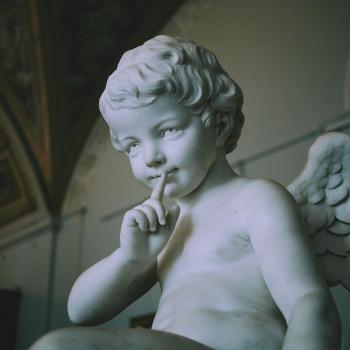I wonder how the boy Jesus gradually figured it out. I think maybe he was looking closely at the darting yellow eye of a bird. Maybe he felt it looking up from the road at the gently-rocking, leprosy-ridden bodies along the crags of the hills nearby. I think when he hung playfully by his clasped hands from the neck of a friendly camel and looked straight into its hyphen-shaped pupil, he noticed it. Maybe even while flinging pebbles into the creek with his friends during the rainy season, he experienced moments at a distance from them, hearing their voices and laughter downstream, when he grew still and realized it.
When Jesus slept, did he dream? And what did he dream of? And did he dream and know during the dreaming that he was dreaming? A lucid dream? I think he did. Out on a walk the next morning on the way to the village well, the wind blowing through his hair, he stopped for a moment, looked at the horizon and it occurred to him. Am I dreaming now? And if this is a dream, then who exactly is doing the dreaming? Perhaps he then heard the words in his mind: I AM.
That strangest of lines from Torah, when a voice said to the eventual liberator: “This is what you will tell the Israelites: I AM has sent me to you.” Jesus thought a very dangerous thought at that moment: Is God dreaming me? And if God is dreaming me, then is God not also dreaming the yellow-eyed bird, the lepers along the crags, the friendly camel, my friends in the creek? Not dreaming of seeing them—but is God actually dreaming through them in the same way that God is dreaming through me?
This thought is not unlike when you’re a kid at the movies, and you turn around and see the brilliant white cone of light coming from the little square window high up on the wall at the back of the theater. When, for a moment, the thought of being God’s dream isn’t simply an idea but, even if for an instant, you realize that this is what’s actually happening, then suddenly certain holy lines you may have heard before take on a new meaning. Lines like:
“While you have the light, believe in the light, so that you may become children of the light” and “For all of you are children of the light and children of the day.”
Was his whole ministry predicated, not upon any idea or philosophy, but upon the realization: that God is dreaming God is us?
I think there were moments when Jesus was at least somewhat afraid of the consequences of this realization. It meant that when the men gathered around, gruffly, ritually, to throw rocks at the woman, that he had to step in and put a stop to it. So you intend to throw rocks at a body through which God has yet to realize that God is dreaming, and yet this is still God. You, poised enforcers of the law, haven’t realized it yet either, so put down your stones.
God dreams God is woman. God dreams God is Roman. But they really had a hard time accepting Jesus reaching out to the squat, wealthy tax collector Zacchaeus. It’s easy to poeticize elegant birds and maybe even mystics of old as somehow being dreamed by God, but how could anybody believe that the annoying and dislikeable Zacchaeus, whom everyone in town had known for years, could possibly be God dreaming?
Jesus stayed with him that evening.
When you realize that each and every life form around you is God dreaming, what is there left to judge? What is there any longer to ignore? Who wouldn’t want to listen to God’s dream tell itself? The distinguishing characteristic of Jesus’ presence—what he felt acutely—and what those around him felt acutely—was that “all are welcome in this place.”
Even sinners and criminals. Jesus knew that sinners and criminals are only God lost in the dream and desperately needing lucidity. “For I was hungry and you gave me food, I was thirsty and you gave me drink, a stranger and you welcomed me, naked and you clothed me, ill and you cared for me, in prison and you visited me.” Wait a minute, even people who have harmed us? And so a friend asked, “If someone sins against me, how often must I forgive him?”
“I say to you, not seven times but seventy times seven.” Forgive always.
But what about justice? Surely we must render justice upon those who hurt us.
No. Those who see God dreaming through all those around them dwell in a consciousness beyond justice. In justice there is separation, but when your consciousness dwells in the pure light of the realization that all are dreamed by God, then the separation becomes an invitation to draw close and become one again.
The prefect Pontius Pilate asks him, “Are you the king of the Jews?” Jesus responds, “My kingdom does not belong to this world.” The essential theme of his every teaching, the Kingdom of Heaven, is that there is a reality that is us, and it isn’t even something we believe. It’s what we already are. We have only to let it shine through us and surround us. It isn’t something of the world. It’s Someone of Whom we always are Who longs to pour forth into the world.
Then the inevitable questions follow: When we have a rough night’s sleep or stub a toe on the leg of a chair—does God dream this? If a doctor says, “I need to let you know that you have cancer.” Is this part of the dream? Are the men who blew people to bits in the Brussels airport God dreaming, and why would God dream such a thing? We can start asking questions about whether Stalin and prisoners of war in Siberian gulags are God dreaming, or whether God would dream of sexually assaulting someone. But when we start asking the philosophical naysayer questions, we’ve already receded into the consciousness of illusion. Saint Paul writes, “The night is advanced, the day is at hand. Let us then throw off the works of darkness [and] put on the armor of light.” Nineteen centuries later these words would be put more succinctly: “far better to light the candle than to curse the darkness.” Jesus recognized this. Why ask the reason for hunger, when we can feed those in need? Why ask the reason for silence when we can pick up the lyre and the drum and play a song?
But the hardest question was asked by Mary as she watched her son, stripped and bloodied, die on the Cross. Why would God have this dream? Why would the light of the world allow itself to go out so quickly? The answer is that the Light, the Life, the Flame had to burn and shine brightly enough that wicks of other hearts would catch fire and the realization would spread. Thus John begins his Gospel: “The true light, which enlightens everyone, was coming into the world. To those who did accept him, he gave power to become children of God.”
Mary held her hand over her mouth, and lay her other hand on his cold, sallow foot, the square, iron nail sticking out. She whispered, “Why?”
“Woman, behold your son.”
We are one family. We are one body. We are one divine being inexorably in love with an imperfect world, aching to draw close. Ignite our hearts. Wake us up. What we call this world is supposed to be God’s dream. What we call this world and our selves is God’s dream.
So what will be the result when this realization spreads to envelope the minds and hearts of all people in the world?
Answer: We will embark on the now singular task confronting the human race: building a planetary civilization, the edifice of which is entirely belonging, welcoming, celebrating. We aren’t at the beginning of the end, as blockbuster movies and the nightly news would have us think. We are, rather, at the end of the beginning. Perhaps, looking down from the Cross at the woman—his mom—Jesus knew this.













